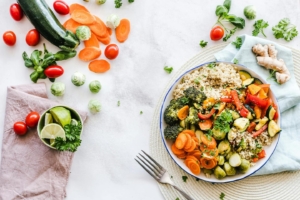3 Steps to Ensure Your Child’s Future of Food Peace and Body Love
 As parents, we all strive to give our children the best, from instilling kindness to encouraging strong, healthy relationships—with others and, most importantly, with themselves. However, what we may not realize is how deeply our own self-perception can shape the way our children see themselves. Let’s explore this further.
As parents, we all strive to give our children the best, from instilling kindness to encouraging strong, healthy relationships—with others and, most importantly, with themselves. However, what we may not realize is how deeply our own self-perception can shape the way our children see themselves. Let’s explore this further.
Picture this: you’re getting ready for a night out, and your daughter is in the room with you. You try on several outfits, but each one seems to highlight a part of your body that you’re unhappy with.
“This dress makes my hips look too big,” you say.
“This skirt shows too much cellulite.”
You say these things out loud, without a second thought. A few days later, your daughter has an event to attend, and as she goes through her closet, she can’t find anything that feels right. She echoes the same words you used earlier, criticizing her appearance in the same way she saw you do.
Children are like sponges, soaking up everything around them—including how we talk about ourselves. Negative self-talk can quickly become internalized by them, leading to body image issues and a poor sense of self-worth. When children hear us being critical of our own bodies, they start to view their own in the same light, often mirroring those negative behaviors.
This is why it’s so important for us, as parents, to show love and gratitude toward our bodies. By appreciating the incredible things our bodies do for us—whether it’s carrying us through a long day, allowing us to embrace loved ones, or simply keeping us alive—we teach our children to value and respect their own bodies. When they see us practicing self-love, they’re more likely to develop a healthy, positive relationship with their own image.
It’s not just about words—it’s about modeling self-compassion, so that they, too, can grow up feeling confident in their own skin.
Here are 3 Steps to Ensure Your Child’s Future of Food Peace and Body Love:
- Stop restricting.
Even if you think you are not restricting, you probably are. The diet mentality is very sneaky and shows up in ways you wouldn’t imagine. Be honest with yourself. Are you substituting zoodles for pasta? Are you choosing cauliflower pizza for regular pizza? Are you ordering 2 veggies instead of a potato and veggie at the restaurant? If yes to any of these questions, then you are restricting.
- Watch your language.
Be very careful how you speak in the home, especially when your daughter is around. Do not be judgmental of food, such as this is a “good” food, and this is a “bad” food. Putting labels on food demonizes food and increases the fear of eating those foods.
- Stop body checking.
When you get dressed and look in the mirror, be aware of your comments about yourself and your body. Be aware of your non-verbal behaviors as well. Looking in the mirror and wincing or grunting are all heard and seen by your daughter. Instead of instilling hatred for your body or body parts, teach what it means to have respect for your body.
The truth is, I recognize that this is all easier said than done. It takes time, patience, and fighting back against the messages you hear every day. But if you want to save your daughter(s) from going down the rabbit hole of dieting, food fear and body worry, then now’s the time.
Ready to work on your relationship with food and your body? Email me at bonnie@dietfreeradiantme.com to set up a quick complementary call.





















